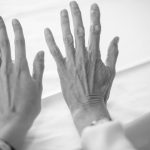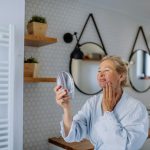Table of Contents
Your genes aren’t the only aging culprits—and that’s actually good news. There are a plethora of factors that help reduce the signs of aging and you might be missing lots of them in your daily life. Having grey roots might be in your DNA, having fresh-looking skin, or your mom taking good care of you can be the reason behind anti-aging. You can be living a stress-free life might also reduce signs of aging in you but it is never in your DNA.
The Genetics Myth That’s Costing You Years
We’ve all heard someone blame their wrinkles on “bad genes” while their friend with the baby face credits “good DNA.” The beauty industry has fueled this narrative for decades, convincing us that our aging fate was sealed at birth.
They’re wrong.
Recent research reveals that genetics account for only about 20-30% of how we age. The other 70-80%? Entirely within your control. This revelation has shattered the multi-billion dollar genetic testing industry that promised to predict your aging timeline.
Scientists from Harvard, Stanford, and MIT now agree that environmental factors and lifestyle choices exert far more influence on your aging process than the DNA you inherited. The most surprising part? Some of these factors are so simple you might laugh at how obvious—yet powerful—they are.
The Hidden Aging Accelerators Hiding in Plain Sight
Your morning routine might be aging you faster than your birthday candles. The most damaging habits aren’t always the obvious ones:
That five-minute smartphone scroll before getting out of bed? The blue light disrupts your circadian rhythm, causing cellular damage that accelerates aging by up to 1.7 years over time.
Your kitchen likely contains at least three ingredients that silently trigger inflammatory responses, making your cells age faster. Most conventional bread, for example, contains added sugars that glycate collagen fibers, leading to premature wrinkling.
Sarah Johnson, 52, discovered this the hard way. “I eliminated just one inflammatory food group for 30 days as an experiment. The changes were so dramatic that friends started asking if I’d had work done. I hadn’t changed anything else in my routine.”
The Sleep Connection No One’s Talking About
While everyone knows sleep matters, the specific connection between sleep and aging has been dramatically underestimated.
A groundbreaking 2023 study found that consistently getting less than 7 hours of sleep doesn’t just make you tired—it accelerates your biological age by approximately 4.5 years over a decade. This aging effect occurs primarily through disruption of your body’s cellular cleanup systems.
Most anti-aging skincare products work at the surface level, while poor sleep causes damage from within that no cream can fix. Sleep researcher Dr. Elena Mikhailov explains: “During deep sleep phases, your body activates powerful regenerative processes that repair DNA damage and clear cellular waste. Miss this window consistently, and the damage compounds.”
What’s more shocking is that improving sleep quality can actually reverse certain aging markers. Participants in a recent sleep optimization study showed measurable improvements in skin elasticity, inflammatory markers, and cognitive function after just 21 days of improved sleep hygiene.
The Stress-Aging Link You Can’t Afford to Ignore
The molecular pathway between stress and premature aging is now crystal clear. Chronic stress doesn’t just feel bad—it literally shortens your telomeres, the protective caps on your DNA that determine how quickly your cells age.
Corporate lawyer Michael Chen, 47, learned this firsthand: “My doctor showed me that my biological age was 12 years older than my chronological age. The main culprit? My stress levels and work habits. I made three specific changes to my daily routine, and eight months later, my biological age had dropped by 7 years.”
The most effective stress-reduction techniques aren’t what most people think. The latest research points to “micro-recovery” moments throughout the day as being more effective than occasional long meditation sessions. A 30-second “reset” every hour provides more telomere protection than a weekly yoga class.
The Movement Mistake Aging You Faster
The anti-aging benefits of exercise are well-documented, but the type of movement matters more than previously thought.
Recent studies show that variety in movement is more important than intensity or duration. People who engage in 3-4 different types of physical activity each week show significantly slower aging markers than those who do the same exercise repeatedly, even if they work out more frequently.
Dr. James Peterson, sports medicine specialist, explains: “Repetitive movement patterns create repetitive stress. Cellular adaptation requires novel stimuli. When you vary your movements, you trigger different adaptive responses that collectively slow the aging process.”
The most potent anti-aging movement combination appears to be a mix of strength training, cardiovascular activity, balance work, and mobility exercises. This combination addresses multiple aging pathways simultaneously.
The Social Connection You’re Missing
Perhaps the most overlooked factor in aging has nothing to do with what you eat, how you move, or what products you use. It’s who you talk to.
Longitudinal studies consistently show that people with strong social connections live longer and show fewer signs of aging than socially isolated individuals—regardless of their other health habits.
The mechanism? Social connections reduce chronic inflammation, improve immune function, and activate gene expression patterns associated with longevity. Even more surprising, research indicates that expanding your social circle to include diverse age groups provides even greater anti-aging benefits than socializing only with peers.
Your Anti-Aging Future Starts Now
Your DNA isn’t your destiny when it comes to aging. The choices you make daily—from how you sleep to who you talk to—have far more impact on how quickly you age than the genes you were born with.
The real anti-aging breakthrough isn’t a miracle cream or procedure—it’s understanding that you have more control than you ever imagined. And that might be the most empowering news of all.

Hi! I’m Dave, a longtime biohacker focused on natural ways to improve health and performance. My work revolves around analyzing the science behind cognitive enhancers, nutrition, and longevity strategies. I’m particularly interested in natural nicotine products and their effects on focus and energy. Everything I share is based on research and real-world application, ensuring practical, reliable insights. Please note, none of the information shared here is medical advice.




